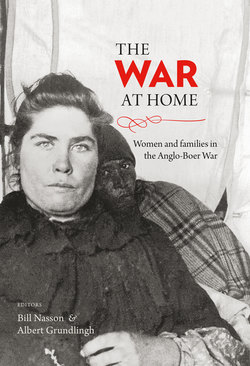Читать книгу The War at Home - Helen Bradford - Страница 9
На сайте Литреса книга снята с продажи.
When professional soldiers wage war
Оглавление| Boer forces on the offensive at Mafeking in the early stages of the war |
The British army, and other armed forces in Europe, became increasingly professionalised in the late nineteenth century. War was conducted in a less haphazard manner than the former method of simply overwhelming the enemy by charging at them. And this was one of the more indirect reasons for the concentration camps.
The British Empire was involved in many military expeditions and it was becoming necessary to conduct war in a more solid, comprehensive and varied way. Different expeditions required different approaches, and military planning was adjusted accordingly. Command structures, logistics and strategies were determined bureaucratically and with specific outcomes in mind.
Military professionalism created a distinct culture that emphasised instrumental rationality – the belief that the end justifies the means. This became so entrenched that other considerations were gradually eliminated. Among other things, it led to military personnel assuming the responsibility of organising the civilian population when hostilities spread from the battlefield to society at large.
| If not the republican Irish, blame the republican Boers: a bridge over the Vaal River blown up by Britain’s enemy. |
As professional soldiers, the military leadership considered that they possessed the competence to deal with civilian matters as well, but gave little thought to their potential complexities. This attitude made it relatively easy for them to implement extreme measures and to justify them. An academic explanation of this mindset maintains that ‘militaries, because violence is their business, do not need external ideologies or motivations to encourage excess; and their basic assumptions (the military culture) that develop to handle it may be sufficient in themselves’.[1]
When the civilian population of the two republics initially came under military rule, the way they were treated foreshadowed what would happen later in the Anglo-Boer War. The poor handling of the Boer civilians was not an exceptional case, as similar approaches had been taken by military leaders before.
Professional armed forces had played a part in the reconcentrados, the concentration camps established by Spain during its campaign in Cuba from 1896 to 1897. The Spanish forces were under the command of General Valeriano Weyler, who was sent to Cuba in February 1896 to suppress the rebellion that had erupted the previous year. The Cuban rebels had looted buildings, burnt houses, destroyed tobacco plantations and sugar mills, wrecked trains and blown up bridges. Weyler tried to control the revolt by limiting the number of conflict areas, and he divided the island into sectors and fortified them. The rebels may have wreaked havoc, but Weyler retaliated with even more destruction.
Weyler’s most controversial measure was to move all non-combatants into concentration camps, which consisted of small huts in protected towns. The inmates’ houses were burnt and their livestock confiscated. The mortality rate was particularly high and approximately 125 000 people died in the camps. Weyler’s methods acquired a stigma of excessive cruelty.
In 1897 a South African newspaper described his actions as a blot on the reputation of the ostensibly civilised Spanish nation. During the Anglo-Boer War, the prominent Cape politician John X. Merriman wrote in a letter to his mother: ‘What can an Englishman say of our doings in the Free State, burning, plundering and turning helpless women and children adrift in this weather. Doing as Weyler did when he made the reconcentrados in Cuba.’[2]
| Riding but not without resting: Boer forces busy securing one of their camps, or laagers |
Similarly, the influential David Lloyd George said in July 1900 in the British House of Commons that the leadership of the British army seemed to be following in Weyler’s footsteps.
Besides the events in Cuba, other similar trends in warfare can be observed in the war between the United States and the Philippines from 1899 to 1902, when certain civilians also bore the brunt of the conflict.
Therefore, the camps in the Transvaal and Orange Free State were, among other things, part of a broader pattern of the increased professional nature of armies and military affairs. The trend also manifested in other parts of the world, and featured widely in the press. Although the British military leaders did not deliberately base their policy on Weyler’s, they were, nevertheless, generally aware of the direction in which warfare had started moving by the end of the nineteenth century.
| British forces parade in Bloemfontein following their capture of the Orange Free State capital in March 1900, but the first taste of conquest was not destined to be sweet. |
| Far left: Not a veteran of Britain’s earlier colonial wars for nothing, Field Marshal Lord ‘Bobs’ Roberts, commander-in-chief of British forces from January 1900, brought with him past experiences of crushing challenges to the empire in India, Afghanistan and Abyssinia. Left: Anything but a pushover for Britain: the bittereinder general, Christiaan de Wet |
